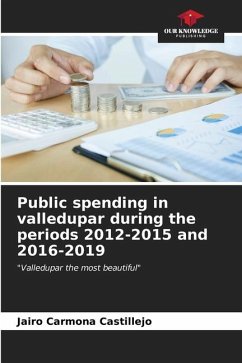
The procurement strategies for the Olympic Stadium and the Aquatic Centre for the London 2012 Olympic Games
Versandkostenfrei!
Versandfertig in 6-10 Tagen
34,99 €
inkl. MwSt.

PAYBACK Punkte
0 °P sammeln!
The International Olympic Committee announced on the 6th July 2005 that the Games of the 30th Olympiad in 2012 will take place in the city of London.Three years later, a lot of preparation work has already been done to get London ready for hosting the world's most prestigious sporting occasion. Over 192 buildings have been demolished, one million cubic metres of soil excavated, two six kilometer tunnels and 200km of cabling are completed, and most of the contractors for the new sporting facilities are appointed.The Olympic Park will be at the centre of this large development project and spans ...
The International Olympic Committee announced on the 6th July 2005 that the Games of the 30th Olympiad in 2012 will take place in the city of London.
Three years later, a lot of preparation work has already been done to get London ready for hosting the world's most prestigious sporting occasion. Over 192 buildings have been demolished, one million cubic metres of soil excavated, two six kilometer tunnels and 200km of cabling are completed, and most of the contractors for the new sporting facilities are appointed.
The Olympic Park will be at the centre of this large development project and spans two million square metres of the Lower Lea Valley in East London. Most of the new build venues and sporting facilities will be sited here; amongst them are the two flagship venues: the Olympic Stadium and the Aquatics Centre. The construction and operation of these sports facilities for the Games will be undertaken by the London Organising Committee of the Olympic Games (LOCOG). The delivery of the venues in time, within budget and to the required standard, however, is the responsibility of the Olympic Delivery Authority (ODA). The ODA is a non-departmental public body and acts in essence as the delivery organisation for all the construction activity. In the Pre-Olympic phase (2005- 2011) the construction of the Olympic venues will be at the centre of public attention, and scrutiny. Construction industry practices will be placed under the microscope in the time leading up to the Games, especially the ODA's developed and introduced strategy for procuring the infrastructure.
This study aims to determine whether the procurement strategies chosen by the ODA are the right choice for delivering the two main venues in the Olympic Park in time, on budget and to the required quality. In order to answer this question, the approach of this study is to undertake extensive research in the subject area of construction procurement and to identify best practice in making procurement decisions for a project. In particular, the procurement strategies chosen by the ODA will be researched and their shortcomings identified. Based on this theoretical framework, the author will be able to undertake a systematic analysis of the decisions made by the ODA to procure the two most prestigious venues in the Olympic Park. As a main part of this analysis the author will conduct semistructured interviews with key people involved in the Olympics and with experts of MSc Management in Construction - the industry.
Three years later, a lot of preparation work has already been done to get London ready for hosting the world's most prestigious sporting occasion. Over 192 buildings have been demolished, one million cubic metres of soil excavated, two six kilometer tunnels and 200km of cabling are completed, and most of the contractors for the new sporting facilities are appointed.
The Olympic Park will be at the centre of this large development project and spans two million square metres of the Lower Lea Valley in East London. Most of the new build venues and sporting facilities will be sited here; amongst them are the two flagship venues: the Olympic Stadium and the Aquatics Centre. The construction and operation of these sports facilities for the Games will be undertaken by the London Organising Committee of the Olympic Games (LOCOG). The delivery of the venues in time, within budget and to the required standard, however, is the responsibility of the Olympic Delivery Authority (ODA). The ODA is a non-departmental public body and acts in essence as the delivery organisation for all the construction activity. In the Pre-Olympic phase (2005- 2011) the construction of the Olympic venues will be at the centre of public attention, and scrutiny. Construction industry practices will be placed under the microscope in the time leading up to the Games, especially the ODA's developed and introduced strategy for procuring the infrastructure.
This study aims to determine whether the procurement strategies chosen by the ODA are the right choice for delivering the two main venues in the Olympic Park in time, on budget and to the required quality. In order to answer this question, the approach of this study is to undertake extensive research in the subject area of construction procurement and to identify best practice in making procurement decisions for a project. In particular, the procurement strategies chosen by the ODA will be researched and their shortcomings identified. Based on this theoretical framework, the author will be able to undertake a systematic analysis of the decisions made by the ODA to procure the two most prestigious venues in the Olympic Park. As a main part of this analysis the author will conduct semistructured interviews with key people involved in the Olympics and with experts of MSc Management in Construction - the industry.













